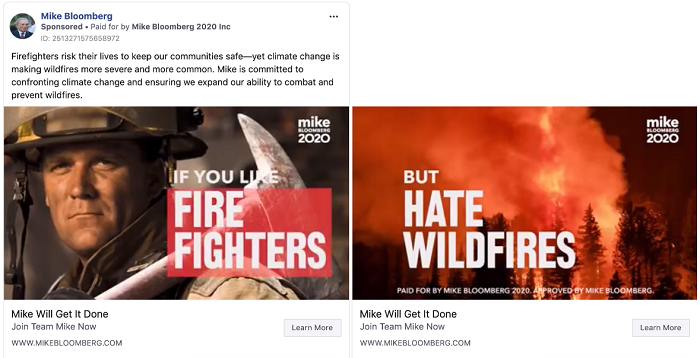SOCIAL
Facebook Considers Tougher Transparency Rules in Response to Tactics Used by Bloomberg Campaign

We’re less than a month into the official US Presidential campaign cycle, and already Facebook’s advanced rules around political content are being tested.
A week after implementing new rules around the use of memes by political candidates, in response to tactics being deployed by the Bloomberg campaign, Facebook is now once again being forced to re-assess its process, this time with respect to how Bloomberg is using campaign staffers to distribute his messaging through their personal networks.
As per CNBC:
“Bloomberg’s campaign is hiring more than 500 deputy field organizers, a job which includes mobilizing supporters for get-out-the-vote efforts and engaging friends to support Bloomberg for president – which can include sharing on social networks. But Facebook is concerned about the lack of transparency around Bloomberg’s employees unidentified posts, and doesn’t want to undercut all the work the company has done around transparency by allowing a campaign to circumvent Facebook’s rules.”
Essentially, Facebook is now looking into whether personal posts from campaign staffers and supporters need to also come with a disclaimer to signify their affiliation.
In some ways this seems like a stretch – people are free to share what they like on the platform, regardless of their professional ties – but then again, if this is built into a contract with the Bloomberg campaign, and a level of sharing is required or mandated as part of such duties, that muddies the waters significantly.
It seems that, despite Facebook’s many efforts, there are still some holes in its political campaign policies.
Will that become a bigger problem moving forward?
With the rise of social media as a tool for political messaging, there are some significant questions around the power of social to influence the vote – and just how powerful Facebook, in particular, can be for shifting public sentiment.
Clearly, political operatives see major potential in the platform. The Trump campaign has spent $20 million on Facebook ads in 2019 alone, while incoming Presidential candidate Mike Bloomberg has already blown them away, spending $48.5 million on Facebook ads since last May.
Of course, for Bloomberg, who has a net worth of $65.2 billion, this is a relatively minor outlay – but will it work? Can the person with the most money to spend on social media ads dominate the discussion enough to actually win the vote?
At this stage, that seems unlikely. The Guardian recently conducted an analysis of Bloomberg’s campaign ads, and while there are certainly a lot of them, its assessment found that they lack political substance, and don’t properly utilize Facebook’s advanced audience targeting capacity, which has ultimately seen them fail to connect with voter pain points in the same way the Trump campaign’s efforts have.

But there are a lot of them – take a look at this chart from The Guardian in regards to Facebook ad impressions in 2020.

Yet, without the same political bite, and in-depth targeting focus of the Trump campaign – which one Facebook exec said was the “the single best digital ad campaign I’ve ever seen” – it does seem like Bloomberg is failing to gain traction. Add to that a poor showing in the recent Democratic debate, and it would appear that candidates need more than Facebook ads to win an election.
But then again, there is precedent for those that can win the mentions race going on to win the final vote.
Indeed, various research reports have shown that mention volume alone is the best indicator in predicting vote outcomes based on social media activity.
A study conducted by Dublin City University in 2011 found that tweet volume was “the single biggest predictive variable” in election results, based on their analysis of political sentiment and prediction modeling, while another study conducted by the Technical University of Munich in 2010 found that:
“The mere number of tweets reflects voter preferences and comes close to traditional election polls.”
Maybe this is what Bloomberg is hoping for – by dominating the media cycle, maybe he can go on to dominate the polls. In this sense, it would be less about the specifics of his messaging and more about his capacity to ‘flood the zone’, a tactic used by former Trump strategist Steve Bannon to maximize Trump’s messaging.
Maybe, with more money, Bloomberg will have greater capacity to dominate proceedings, and dwarf the arguments of his opponents. That doesn’t feel likely at this stage. But that could be – or could have been – the Bloomberg campaign’s plan.
